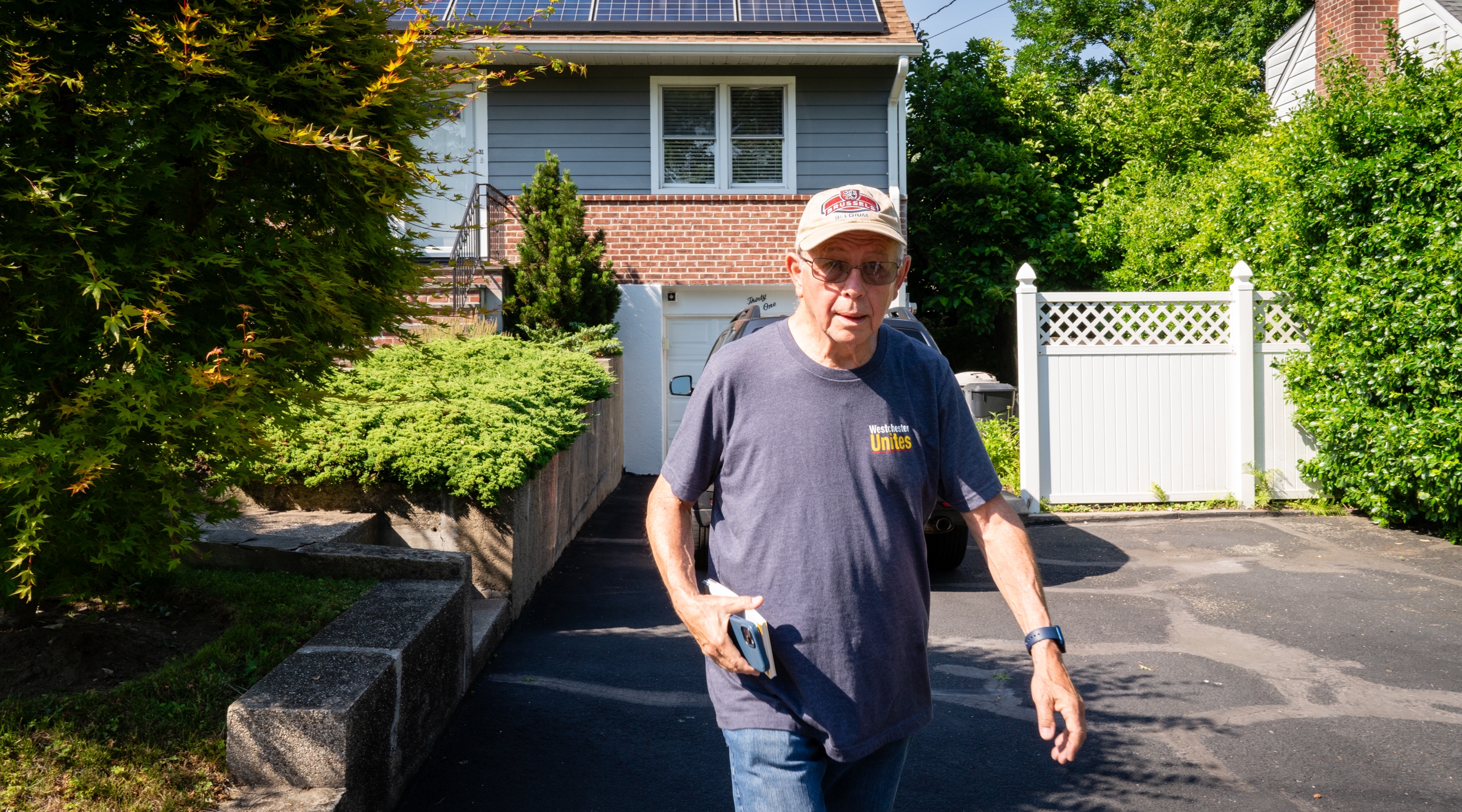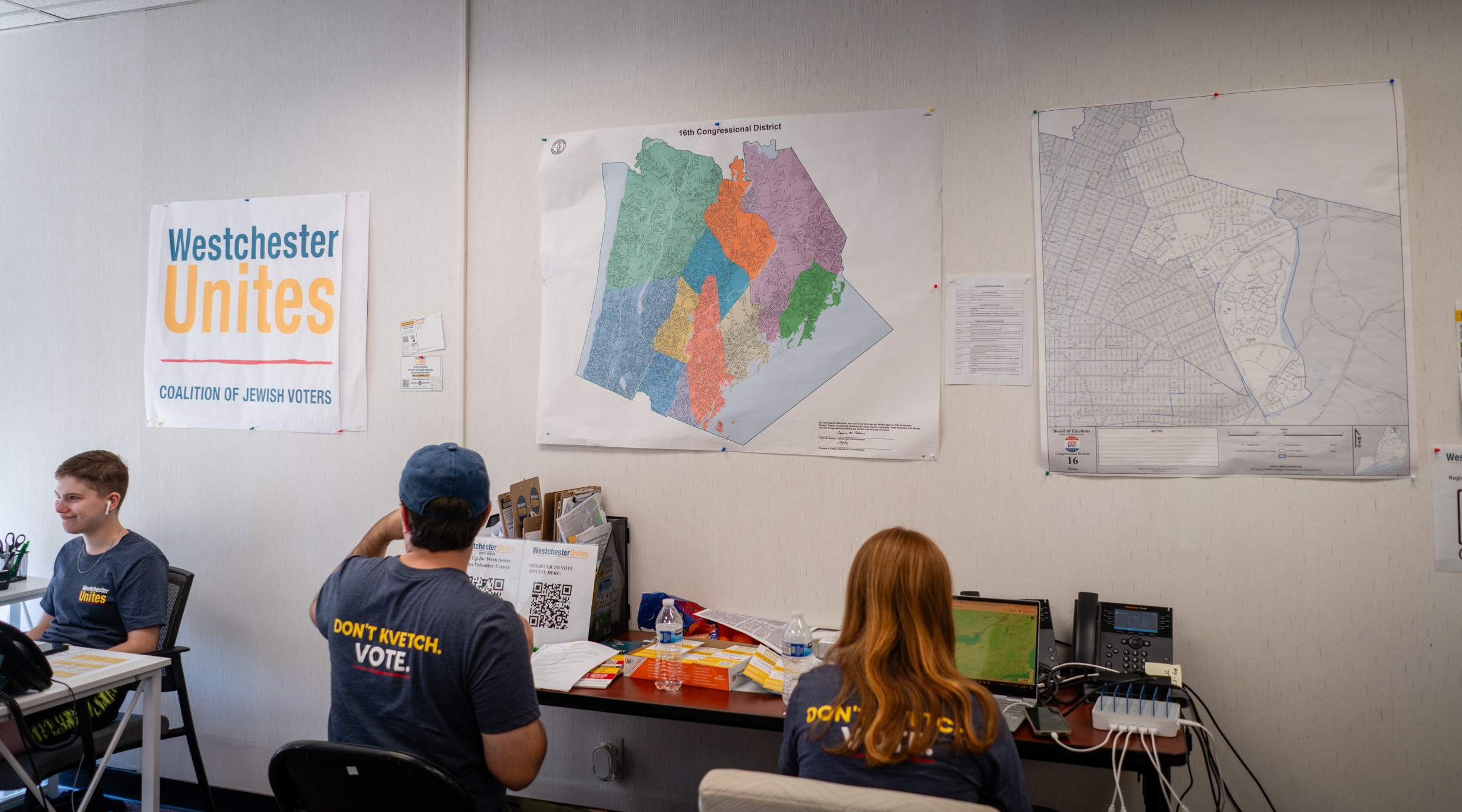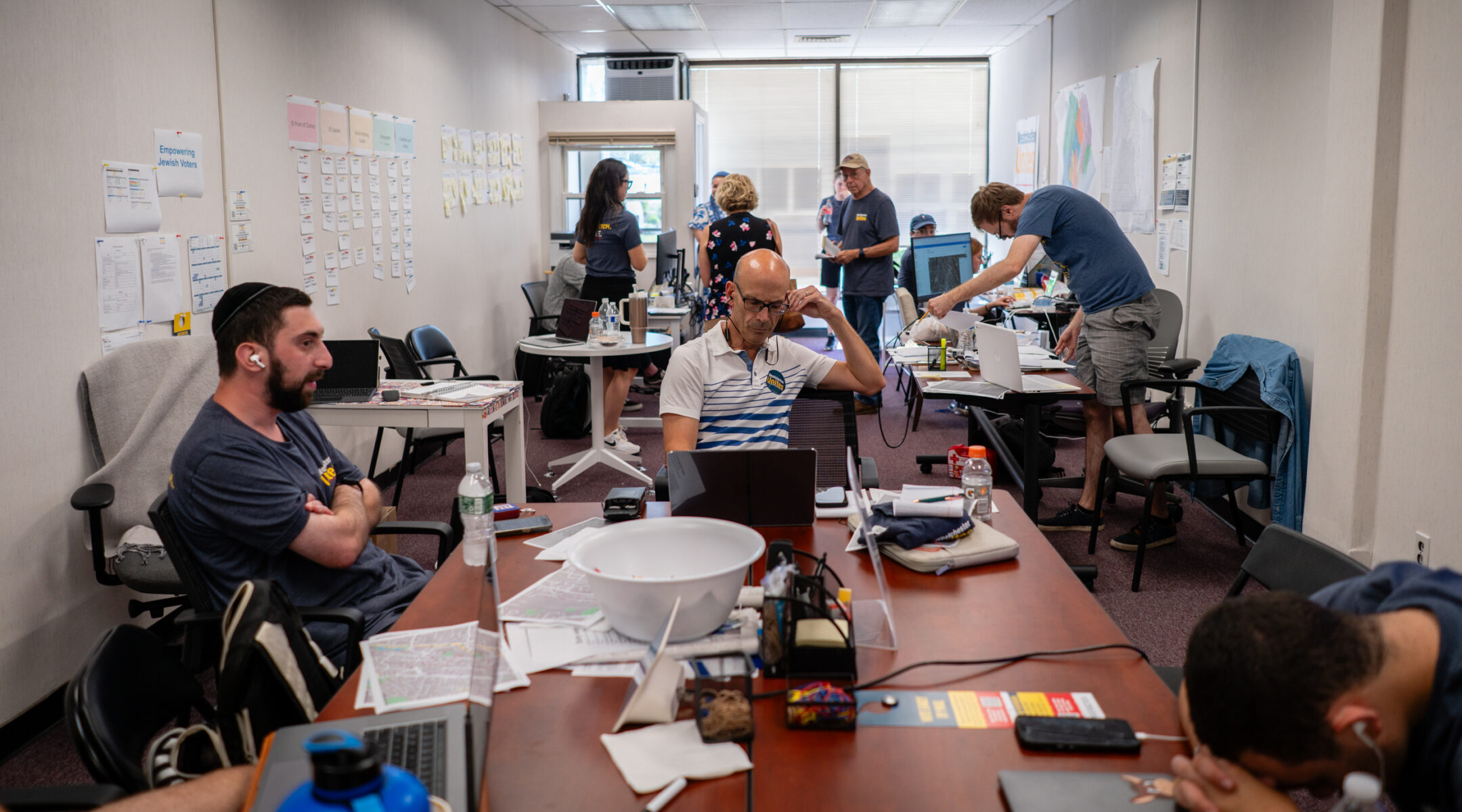In the years before Oct. 7, Steven Epstein wasn’t the type to go door to door in New York City’s northern suburbs to get out the vote.
But that changed when Hamas attacked Israel. The attack hit home for the 77-year-old retiree, who has Israeli grandchildren. In particular, he is unhappy with his congressman, Jamaal Bowman, who has called for a ceasefire in Israel’s war against the terror group and who has accused Israel of “genocide.”
And on Wednesday afternoon, as Epstein approached a woman in her driveway on a leafy suburban street, a stack of fliers in hand, he delivered a blunt message:
“We’re here because antisemitism is on the ballot and voting has started,” Epstein said. “We don’t care who you vote for for president, we care about this election. We care that the Jewish vote is heard.”
Epstein is one of hundreds of volunteers who are making a final push in the days before the June 25 congressional primary, which pits Bowman against centrist Democrat George Latimer. Their 16th district covers Westchester County as well as a sliver of the Bronx and has a large Jewish population.
The Democratic race in this blue district is seen as a bellwether for the clash between centrists who support Israel, like Latimer, and progressives like Bowman who are among its most outspoken critics. The race has received significant national attention, and millions in campaign spending, but in the suburbs that make up the bulk of the district, Epstein and his fellow volunteers want to make sure Jews actually turn out to vote.
For Epstein, a typical day of volunteering means spending two to three hours canvassing, with visits to 35 to 50 houses. The door-knocking effort is organized by Westchester Unites, a project of the Orthodox Union’s Teach Coalition, a nonpartisan education advocacy group that does not endorse any candidates. Epstein hews to those rules — and says he doesn’t feel hindered by them.
“We’re not trying to persuade anyone. I don’t have to say, ‘Here are all the reasons you should vote for Latimer, here are the reasons you shouldn’t vote for Bowman.’ I’m not allowed to,” he said. “But the Jews know and what you have to do is tell them we really need to get the Jewish vote to count.”

Steven Epstein canvasses houses in Eastchester, New York, June 19, 2024. (Luke Tress)
Polls show that Bowman, a member of the hardline-left “Squad” in Congress, is likely to lose on Tuesday after two terms in office. On Monday, he apologized for casting doubt on reports of Hamas’ sexual violence, a stance which had drawn backlash from supporters of Israel. Bowman has received support from smaller, left-wing Jewish groups like Jews for Racial and Economic Justice, although the liberal pro-Israel group J Street withdrew its endorsement after his “genocide” remarks.
Dan Mitzner, an organizer with Westchester Unites, said rhetoric surrounding the war in Israel has motivated Jewish voters.
“It’s about educating this community about what’s at stake in this race and the different ways in which they can vote,” Mitzner said. “People feel like antisemitism is on the ballot and they feel like, for the first time, we are a community at risk.”
The group is pushing for early voting and mail-in voting, and is encouraging as many Jews as possible to show up on Election Day. It has partnered with around 30 Jewish institutions and ran a “We Vote Shabbat” campaign this past Saturday that had synagogues around the district announce the start of early voting.
In January, Westchester Unites opened a “voter center” out of an office in New Rochelle where volunteers stop by when they have free time to make phone calls and set out to canvas neighborhoods. The group uses publicly available data and software to target areas with Jewish voters and sends volunteers on routes through those areas.
Mitzner estimated that 700 volunteers are campaigning by canvassing neighborhoods, sending out text messages and emails, and making phone calls. Organizers said the group had made more than 17,000 phone calls and knocked on more than 5,000 doors.
The group says it has notched successes, cross-referencing voting data from the local Board of Elections with a list of 26,000 likely Jewish Democratic voters in the district. As of June 17, it estimates that the Jewish community has accounted for more than 40% of all early votes in Westchester, despite making up 9% of eligible voters. At one synagogue, it says, 62% of members have already voted.

Volunteers staff the phones in the Westchester Unites office in New Rochelle, New York, June 19, 2024. (Luke Tress)
The Jewish demographics in the area are mixed, with large numbers of Democrats, Republicans and independents, but the effort has been well-received across the board, Mitzner said.
“It’s been a pretty diverse kind of participation, from Reform to Modern Orthodox and everything in between,” he said.
In Westchester Unites’ headquarters, the walls are plastered with maps of the district and post-it notes with reminders, such as a call for “tripling texts,” or asking people to pass early voting information on to three friends.
“Hi, is this Clifford?” a volunteer said on a call. “I wanted to know if you knew that early voting had started, and if you will be voting early.”
The volunteers are overwhelmingly, but not exclusively, Jewish, organizers said. Many wore campaign shirts with the slogan, ”Don’t kvetch. Vote.” (It’s a possible reference to an off-the-cuff line delivered by then-President Barack Obama during the 2016 campaign, when he admonished a crowd, “Don’t boo, vote.”)
Jessica Haller, the campaign director, said the project had significance beyond Tuesday’s result.
“This project is not about the election, it’s about voter empowerment. It’s about empowering the Jewish community to turn out,” she said. “I know, we all know, that communities that don’t vote don’t get paid attention to.”
Epstein, during his second round of canvassing on a brutally hot Wednesday afternoon, said the effort helps him feel he is making an impact in a race he is deeply concerned about. At each stop, he sized up the house while he approached, looking for cars in the driveway, campaign signs and mezuzahs on doorposts.
After he met the woman in her driveway and delivered his pitch, she told him she had changed her party registration from Republican to Democrat in order to vote in the primary. She accepted a flier with early voting locations, and asked where she could get a lawn sign.
“God bless,” Epstein responded.
The New York Jewish Week brings you the stories behind the headlines, keeping you connected to Jewish life in New York. Help sustain the reporting you trust by donating today.





